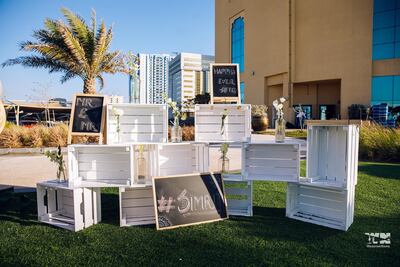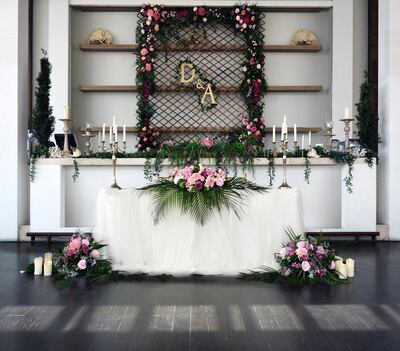A few weeks ago, an intriguing wedding invitation popped into my inbox. The digital note called on friends and family of the happy couple to celebrate their nuptials in the most environmentally friendly way possible. "We are always trying to find little ways to be kind to nature and would request your wholehearted co-operation," it read. Next came a list of dos and don'ts: visiting and supporting the hosting resort's organic farm, and avoiding plastic and food waste were among the former. The invitation even encouraged guests to "pick up a shovel" and plant trees on the day before the wedding.
Rhiannon Downie-Hurst, founder of Brideclubme.com, a wedding-inspiration website and concierge service, says that while she has heard about the concept of sustainable weddings since starting her business nine years ago, it has picked up speed over the past three years. "Millennials and Gen Z are generally more socially conscious and aware of environmental issues," she says. "I think this has a lot to do with the ease of access of information online, various movements and the fact these generations can see what is happening in front of them. It is an issue many are passionate about and this naturally spills over into weddings. Anywhere they can reduce impact, they try."
Downsize the decor
Take the case of Alisha Mishra and Demetrius Pais, who tied the knot in Goa, India, last month. The couple include sustainable options in their daily lives, so it was only natural to make their big day as eco-friendly as possible.

"I've been educating myself on the dangers of plastic for years and carry a reusable water bottle every time I go out," says Mishra, who is behind the Grey Murmurs blog. "We decided to use a similar concept for the wedding. Instead of distributing plastic bottles to guests, we had water canisters placed around the venue. We thought people might complain about the inconvenience, but no one seemed to even notice.
"A plastic bottle outlives its usefulness after the water is gone and then it just contributes to the waste. These things add up quickly over a period of time. At the end of the day, a wedding is a function that only lasts a few days – it should not leave a 100-year trail on the planet."
It's only one of the measures taken by the couple, who spent 10 months planning their wedding. "The venue was one of the first major decisions we took together," says Mishra. "We paid more for a property that was abundant in natural beauty, so we could keep artificial decor to a minimum. We also did it outdoors, so there was no need for any extra lights."
The couple further chose natural elements such as coconut shells and leaves in place of polystyrene when creating backdrops, sourced boutonnieres made with paper flowers for the groom and groomsmen, eschewed all plastic cutlery and straws in favour of reusable versions and distributed paper-based confetti to guests.
Mishra also recommends looking at alternatives to wedding invitations or party favours. “If you think about it, no one really reads physical wedding invites any more,” she says. “People just need to know where they have to be and when, and a WhatsApp message will suffice. Of course, with the older generation not always being tech-savvy, some paper invites may need to be distributed, but you could always look at using materials like seed paper instead of the regular variety.”
Weddings tend to be a larger-than-life affair in many countries, including India, with the guest list often running into the several hundreds and grand functions seen as a status symbol. In light of this, are families ready to get on-board with smaller, green weddings? "If a person is generally eco-friendly, the family already knows about it," says Mishra. "You have to simply stand your ground and people will come around. If you're keen on a green wedding, start talking to your family and friends about the pros and cons beforehand. All I know is that, at our wedding, all that mattered to our guests was the fun we had – not the tablecloth, chairs or water canisters."
She says having a planner who understands what the couple wants and who works with them to come up with sustainable ideas is crucial. Her wedding planner opened up her company's inventory to the couple so they could reuse accessories such as tablecloths instead of buying or making new pieces.
Vegan weddings
Another environmentally friendly approach to weddings involves veganism, but while the diet may be on the rise worldwide, the concept of a vegan wedding is largely unheard of. UAE residents Simran Gandhi and Amrit Shivlani have been vegan for the past three years and their families also follow a plant-based diet, which cemented the couple's idea to have a vegan wedding. When they began planning last year, they received positive and negative feedback. "There were a lot of jokes, sarcastic comments from people asking if they would have to bring in their own food," says Gandhi.
Even when they approached the venue in Ajman, it "didn't quite understand the concept at first", she says. "It took maybe a month of speaking to the chefs and then experimenting with various recipes before they confirmed they could do it according to their usual standard.
"We imported mock meat from Malaysia and India, and provided cartons of vegan milks [for tea and coffee] and vegan cheese.
But people actually did say the food was lovely and that they couldn't even tell some of the dishes were vegan."
On the menu were dishes such as mock fish and chips with vegan tartare sauce, spicy tofu and ginger chilli sauce, shawarma with plant-based meat and Asian chilli sesame cauliflower. Gandhi says the choice to go vegan led to reduced costs, especially because the couple provided the venue with most of the ingredients. They also incorporated veganism into other aspects of the wedding, such as the bride's make-up, and by banning leather outfits.
"While it wasn't more expensive, it certainly was more work," says Gandhi. "But when the wedding came, it felt really good. All the hours of planning and running around paid off – it felt like sweet victory."
Narrow the guest list
So will this be the year when the concept of sustainable weddings comes into its own. Emaar Hospitality Group seems to think so, as it has listed environmentally friendly nuptials among the top 10 wedding trends of the year. Its team of planners say: "Couples are increasingly ecologically minded and looking to go green whenever they can, using locally sourced foods and recyclable materials, as well as looking at ways to extend the life of decor, such as incorporating photos in frames and wooden artefacts that are then re-used as wedding favours or in the couple's home."
However, according to La Table Events, a wedding-planning company in Abu Dhabi, eco-friendly weddings are yet to take off in the region. "The demand for environmentally friendly weddings is really low here," says director Mark Khawaja. "That being said, most couples are gravitating towards more economical weddings, which invariably makes it [more] eco-friendly by default. If you look at Indian and Emirati weddings, which traditionally had large numbers, now have an average of 150 to 300 guests. It's a huge decrease over the past few years."
Eco-friendly weddings may be rare, but La Table Events took one on in Abu Dhabi in 2018. The ceremony had only 35 guests. "The couple took great pains to keep it small and simple," says Khawaja. "They found a naturally beautiful location, and mostly used the accessories and decorations found within the property. The menu had a lot of vegan and vegetarian options, and they even paid extra to have a van take the leftover food and distribute it to a charitable organisation."
With "zero waste" a buzzword among eco-warriors, it should come as no surprise that couples across the world are looking for ways to minimise food wastage on their big day. Such measures include curating a la carte menus instead of holding buffets or distributing leftovers to the needy. The concept is not limited to food, either. "Zero waste is a lifestyle that focuses on leaving no carbon footprint whatsoever on the planet," says Doua Benhida, founder of The Zero Waste Collective. "That means being aware of how you dispose of plastic and packaging, reducing the amount of transportation required and reusing wherever possible."
The "reusing" part can even include wedding dresses and tuxedos, which can be rented instead of bought. Benhida says she has not yet heard of a zero-waste wedding being held in the region, but says there are a lot of things couples can do to minimise waste, especially when it comes to lavish ceremonies. "Fruit and vegetable peels can be composted instead of being thrown away," she says. "The couple can opt for meaningful giveaways and natural decoration like plants, flowers and jute instead of anything plastic."
One fear is that these measures may inadvertently increase the cost of a wedding, but Benhida is adamant that's not the case. "If anything, your expenses go down. When you say no to useless packaging and plastic, you are automatically reducing how much you are buying. I think the key element here is keeping an event minimalistic because that makes it more intimate and reduces cost. At the end of the day, all you have to ask yourself is: 'Do I really need that?'"





